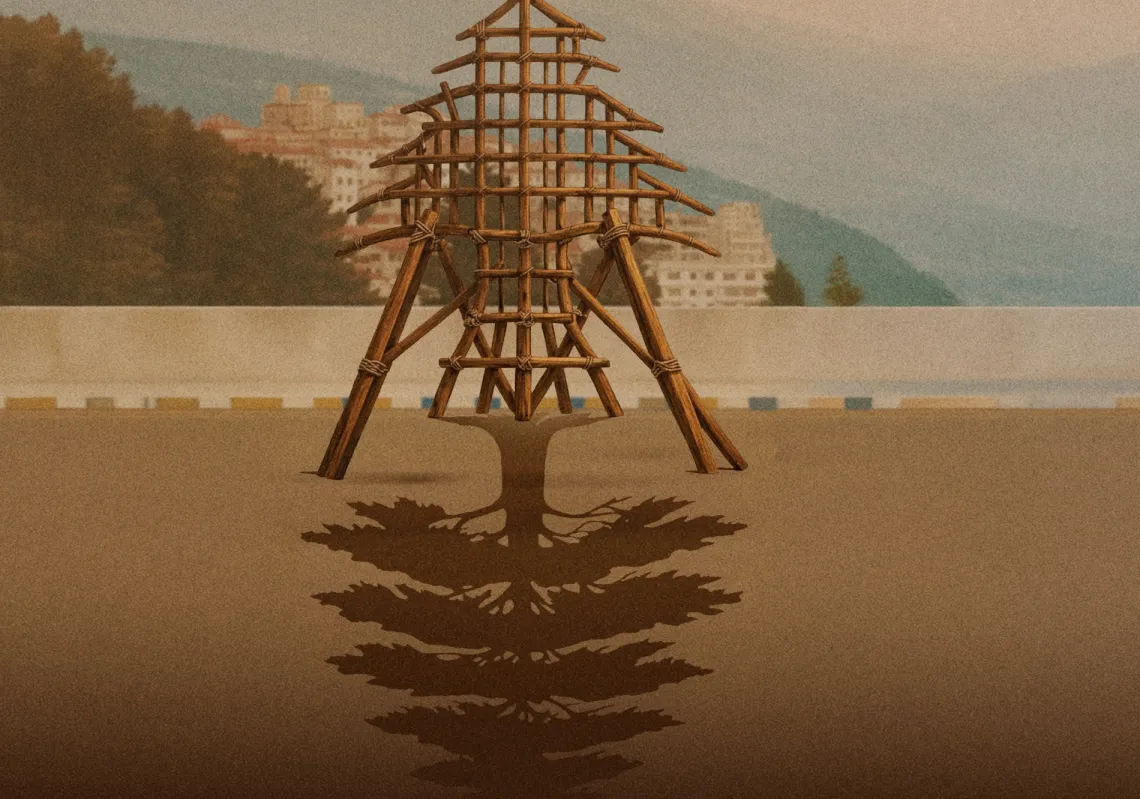Surprisingly, Ahmed Al-Jabari never expected the Israeli rockets could reach his house in the Shuga'aya district in the heart of Gaza. He always trusted his skilful ability to carry out underground military operations, and the very cautious strides he takes, including the walls of secrecy that strictly encompassed his work. Clearly, Al-Jabari thought his multiple aptitudes would allow him to stroll freely and thereby deceive the Israeli Intelligence, who would be unable to track his whereabouts. But suddenly, on August 17th 2004, an Israeli rocket broke Gaza’s stony silence, aiming directly at his house.
At that moment, one of his relatives was visiting Al-Jabari. This visit, it was later discovered, had been tracked by Israeli authorities. The unexpected Israeli raid culminated in the death of Al-Jabari's eldest son, Mohammed, most of his guests, and left a slight wound in one of Al-Jabri’s legs.
From then on, Al-Jabari did not have a peaceful night’s sleep. This failed assassination attempt was the first but it would not be the last, as it was followed by four successive attacks, the last occurring during the latest war in Gaza. Al-Jabari is now wanted by the Israeli authorities, and the Israeli military wants him dead or alive. They pursue him wherever he is, and have already managed to spot him more than once, but he has managed to escape.
Al-Jabari always says to his fellow Hamas members, that he is no longer afraid of bullets or rockets. He knows that the date of his death is written on the warhead of an Israeli missile that hasn't hit him yet. It may be on its way, but he doesn't care anymore. He is content to have spent half of his 45 years in armed resistance, during which he became part of the leadership of Hamas, the second man in the movement's military wing, the Qassam Brigades, and one of its political decision makers.
Being responsible for one of Hamas’ most notorious strategies– the abduction of the Israeli soldier Shalit – has made the name of Ahmed Said Al-Jabari surface once again. It made his name known to Palestinians and Israelis alike. Al-Jabri is solely responsible for making any decision regarding this issue. Hamas' leadership cannot take any negotiation steps concerning Shalit without first consulting Al-Jabari. They trust him, to the extent that he has the authority of determining the conditions for a negotiation with Israel over Shalit. Hamas's leadership believes that Israel's agreement to release 20 Palestinians in exchange for a one-minute tape recording of the soldier Shalit, is the biggest proof that a deal drawn by Al-Jabari can be achieved.
What makes Hamas members more confident in Al-Jabari is the strong conviction they hold about his ability to deal with the Israeli Intelligence Agency. Their evidence of this is that Israel has failed over the past 3 years to determine the whereabouts of their soldier Shalit. The reason for this, they hold, has been Al-Jabari's ability to hide the Israeli soldier in a secret place during the recent Israeli war in Gaza. One objective of this war was to find Shalit and release him from the hands of Hamas. But the war ended with Shalit remaining in captivity, or more accurately, in the possession of Al-Jabari, as not all Hamas leaders know where Shalit is being held.
According to the sayings of some Hamas leaders, this was not the only impact the recent war on Gaza had on Al-Jabari. The war played a key role in giving him a special rank among the members of the movement. In fact, Gaza war has made the movement's leaders, whether at home or abroad, pay more attention to his military ideas.
This has also made the young members of Hamas take an interest in him. They now consider him a model of what a real military commander of Hamas should be like, in terms of discipline, minute accuracy, and his ability to “read the minds of others”.
Al-Jabari, also known in Hamas as "Abu Mohammed", is a father of six children. He comes from a family whose origins extend to the city of Hebron. His career in the clandestine military field began when he joined the armed groups affiliated to Fatah in the eighties, and participated with them in armed operations against Israeli forces. One of his most important missions at that time, was throwing a grenade at an Israeli officer who was working in the district of Shuga'aya near the railway station. As a result of this incident, Al-Jabari was arrested in 1982, and spent the next thirteen years in prison. This was a turning point in his life.
With the start of the first Palestinian "Intifada" and the emergence of the Islamic Resistance Movement, "Hamas," Al-Jabari joined the movement while he was still in prison, and before long, he became one of Hamas's leaders inside the prison. This period of his life allowed him to sit with the elderly leaders of Hamas who had a long history with the movement. One of these top leaders was Sheikh Ahmed Yassin, who stated that Al-Jabari benefited greatly from the time they spent in prison together.
Two years after leaving prison, he became part of the political leadership of the movement. He was responsible for the Al-Noor Foundation, one of the most important institutions established by Hamas. This foundation is in charge of caring for the families of Hamas members who have been killed, wounded, or imprisoned.
From the moment he left prison in 1995, Al-Jabari played an important role in the military operations carried out by the movement. But he faced difficulties, as he was arrested again in 1998, although this time, by the Palestinian Authority. His detention lasted two years. Immediately after his release he was assigned by Hamas' leadership to assist Salah Shehadeh and Mohamed Aldahef, the commanders of the military wing, in the reorganization of Hamas' military action. Al-Jabari played the most prominent role in this task. He became the head of Hamas' military force, or the people's army, formed by Hamas in 2002, for the purpose of confronting the Israeli incursions of the Gaza Strip. His leadership of this army was his first step in highlighting his military character, which made him popular among the members of Hamas.
Since then, Al-Jabari has become a prominent figure among the leaders of the movement. He became one of the pioneers in the field of developing Hamas's military action. He was nicknamed "The commander of the battle field." His fellow fighters have never forgotten the military operations that he has led. They believe these operations were among the most extensive military operations ever to be carried out by the military wing of Hamas against Israelis. These military operations included "The scattered illusion," "The warning explosion," and "The death field."
When Hamas ran for elections on the 25 of January 2006, won the legislative majority, and took hold of the Palestinian government, it was widely expected that Ismail Haniyeh would give Al-Jabari a seat in his cabinet. But this did not occur for two reasons: First, Al-Jabari was wanted by Israel, and second, Al-Jabari was assigned a more important task by the leaders of Hamas: transforming Hamas's military operations against Israel into internal security operations in order to protect the Government from its rivals in Fatah movement. Fatah members were cast by Hamas as enemies and traitors. Abu Mohammed called upon all his men in the military wing to become a protective shield of Ismail Haniyeh and his cabinet members, and to assassinate their opponents. And, when an attempt was made to assassinate Haniyeh himself, Al-Jabari led the military operation that took control of Gaza and turned it into a Hamas colony, after banishing Fatah affiliates. Then began the Palestinian Division period, which all regional and international attempts to end it have failed.
As some members of Hamas say, If Hamas' position on reconciliation was to be decided by only few leaders of the movement, then Al-Jabari would certainly be one of those few. The leaders listen to what he has to say, and his opinion on the condition of Gaza and reconciliation with Fatah cannot be ignored. He is the hidden man who has become a powerful figure inside Hamas. He rejects peace with Fatah because he refuses to give up Gaza. He believes that Hamas's control of Gaza is an achievement to Hamas' credit, which is no less than the achievement of removing the Israeli authority from Palestine. He also rejects any attempts to deal politically with the Palestinian issue, and insists on resorting to the clandestine and military solution. Despite his eyesight problems, a disease he caught while in prison, he is still in favour of a military solution, and is not willing to abandon it, even if it is at the expense of others' lives.







